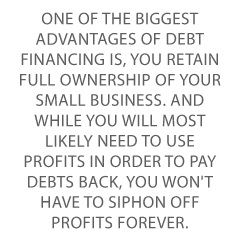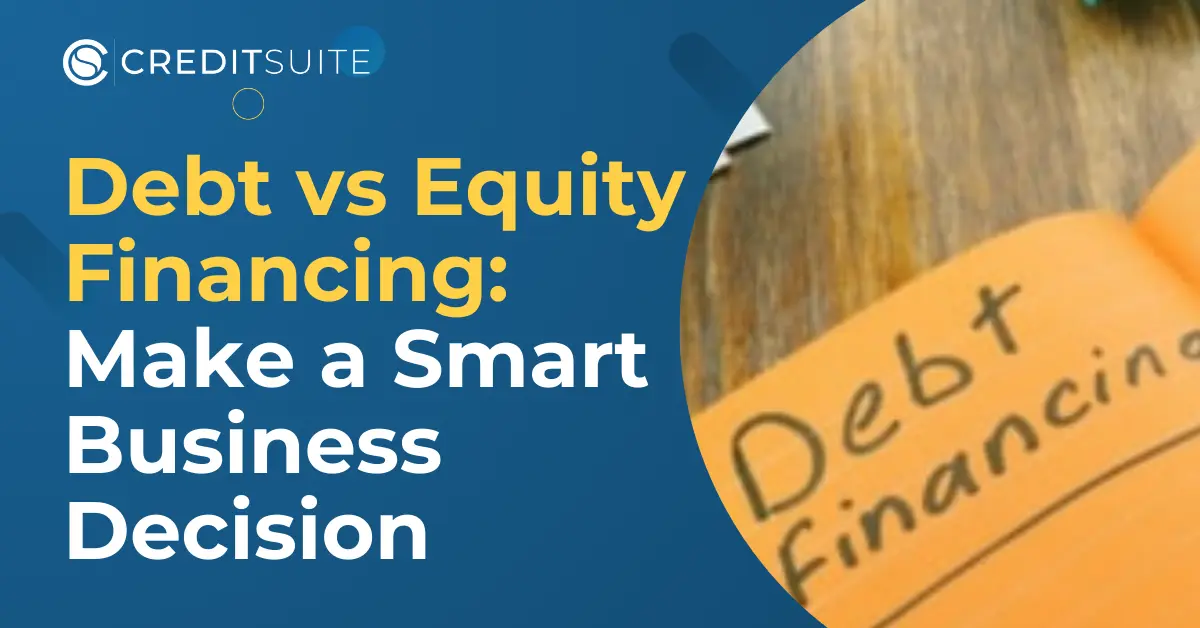If you’re a business owner—particularly a startup business owner—then the question of business financing has likely come up several times. You may be weighing the options of debt vs equity financing. A small business’s best choice depends on circumstances. There are advantages and disadvantages to each of these financing options.
What is Debt Financing?
Debt financing is when a company raises capital by selling debt instruments. In return for such a small business loan, individuals or institutions become creditors. They get a promise that the principal and interest repayment on the debt will be forthcoming.
Simply put, it is when a small business borrows money.
But the merits of one type of debt funding versus another depend on factors like the degree of freedom a business may want over the capital it borrows, and whether there are any obstacles to getting a traditional loan.
Also, there can be restrictions on some loans. For example, the ways businesses could use Paycheck Protection Program (PPP) loans were limited.
In addition, some businesses may be shut out of most bank loans. This can happen if a business is in a more risky industry, such as construction or bail bonds. Startups may also have problems getting business loans, due to little time in business and irregular cash flow. If the owner does not wish to provide a personal guarantee, then this avenue of debt financing may be off the table.
Another reason it may be hard to get a bank loan is due to the owner having poor personal credit. If any of these situations apply, then an entrepreneur can also try for alternative financing, usually offered by online lending firms. But if the entrepreneur does not wish to go this route, then the form of debt financing an entrepreneur chooses will, in part, be chosen for them.
Debt Financing Examples
Debt financing includes loans and business lines of credit. Companies can take on debt in the form of bonds. Businesses may get capital via a pooled debt fund. With debt financing, a small business must pay interest on whatever it borrows. Any interest is always the cost of borrowing cash.
Loans
When most people think of a small business loan, they may think of a bank loan or SBA loan. Yet lenders can be nearly anyone, including family members. It can be for any amount, including microloans. For creditors like the SBA and banks, borrowing rates tie to the Prime Rate.
Business Line of Credit
A business line of credit works as a flexible business loan. The business only has to pay interest on the amount borrowed. Business owners can often access it with a business credit card or checking account. As they pay it back, the amount in the line of credit is replenished.
Bonds
Companies get loans via investors buying their bonds versus going to a bank.
Repayment is via an interest coupon, which is the annual interest rate paid on a bond (face value percentage). Companies often pay interest annually or semiannually and return the principal on the maturity date, ending the loan.
Debt Financing Pros and Cons
One of the biggest advantages of debt financing is, you retain full ownership of your small business. And while you will most likely need to use profits in order to pay debts back, you won’t have to siphon off profits forever. And, without handing over any portion of the business, you are not losing any measure of decision making or control.
Another advantage (although not all will necessarily see it this way) is in the fact that the government regulates most types of debt financing. And repayment rates may be tied to the Prime Rate. Government regulation tends to mean that investors are better protected. As a result, they may be more amenable to investing in the first place.
Just about any business can issue bonds. But public companies have to register bonds with the SEC.
One of the disadvantages of debt financing is that commercial lending is generally not subject to usury laws. As a result, there’s little to keep interest payments from becoming exceptionally expensive.
Another disadvantage is that some forms of business debt financing may require a personal guarantee from one or more business principals. This puts personal assets on the line in the event of a default. But this is the case with every secured loan any time you borrow capital.
For bank loans and many business lines of credit, an entrepreneur will need to have a good personal credit score. For business financing with bad credit, entrepreneurs will likely have to look elsewhere for financing.
What is Equity Financing?
Equity financing is a form of corporate finance where you sell off a portion of your business. In exchange, of course, you get business capital. This helps you pay off any debts on borrowed capital. You can use it to fuel the growth of your business, buy equipment, expand, move offices and more. With someone else getting an ownership interest in your business, you might not have to put in quite so much of your own money, either.
Large, publicly traded businesses will sell shares on the NYSE or NASDAQ for the most part. But for small businesses, and for all privately held companies, the options include a private issuance of shares (this can possibly be via crowdfunding, but is not always), angel investing, and VC investing.
All these options bring with them a dilution of your influence over your own business. Venture capitalists in particular may want to assert control over the direction of your company. Business owners who know they will definitely be getting VC cash might want to consider venture debt, where repaying a loan depends on company access to venture capital.
All equity funding options will require a certain degree of persuasiveness. For extroverted entrepreneurs—in particular, those with public speaking and/or marketing and sales experience—this is unlikely to be an obstacle. But for any introverted entrepreneurs, particularly those who are first-time entrepreneurs, persuading potential investors is nowhere near being a sure thing, no matter how wonderful, new, useful, and unique their product or service is.
Equity Financing Examples
Equity financing can be informal investing from angels, who may even be an entrepreneur’’s own personal friends or family members. VC money is rarer, as VCs often only want to put their capital into specific types of businesses. Equity crowdfunding is an online offering of private company securities for investment.
Angel Investors
Angels are informal investors who buy a smaller part of a business. They generally stay out of business decisions, acting almost like a silent partner. There is little government regulation applicable to angel investors. However, a wealthier angel investor may be an accredited investor and therefore is subject to regulations.
Working with a Venture Capital Firm
VC firms will mainly invest in firms they think will disrupt an industry. They also tend to invest in businesses starting an industry which could take off soon. The best-known and most valuable VC-backed companies include SpaceX and DoorDash. Nondisruptive businesses in established industries generally won’t be on VCs’ radar.
Equity Crowdfunding
This is fairly new, and is regulated by the SEC. With this funding business model, you collect smaller monetary sums from a larger number of private investors. You take on no debt but cede some ownership. One common use of this form of raising equity capital is purchasing real estate.
Equity Financing Pros and Cons
The biggest advantage of equity financing is not taking on debt. Unlike with a loan, you pay no interest! As the economy keeps changing, the Federal Reserve continues to weigh whether to raise the Prime Rate. But with equity financing, it will not truly matter to you what the Fed does.
Another positive is its accessibility to very different types of investors. A venture capitalist may be wealthy and certainly experienced. With angel investing, the equity holder involved can run the gamut of rich, experienced accredited investors to your mom, who only wants to see you succeed. And with equity-type crowdfunding, your acquaintances from social media platforms, and even strangers from around the world can all become an equity investor.
With crowdfunding, none of your equity investors are very large. If you retain over 50% ownership, they’re not likely to be able to band together enough to kick you off the Board of Directors of your own corporation.
One downside is all these require persuading people to make an equity investment. If you’re more of an inventor than a salesperson, it may be hard to make a case to investors that they should take a chance on your and your business and give you funding.
Another disadvantage is splitting future profit. Along with that, you could be diluting your influence in your own company. If enough equity partners do collaborate, they won’t necessarily have to have 50% or more in combined ownership to take over your corporation’s Board of Directors.
Is Debt or Equity More Risky?
It… depends. Circumstances such as the risk level of an industry or the market can make a difference.
For a more scientific approach to deciding on debt vs equity financing, we strongly suggest financial modeling. Financial modeling means creating a summary of your company’s expenses and earnings in a spreadsheet. Then, you can use the spreadsheet to calculate the impact of a future event or decision. Plug in your numbers and get a feel for which plunge (if any) to take.
And consider your equity ratio, a financial metric of the amount of leverage your company uses. It uses investments in assets and the amount of equity to determine how well a company manages its debts and funds its asset requirements.
Too much debt capital can be problematic. Any capital structure where a company is overly leveraged probably means that a company is in trouble.
But in the meantime, no matter what, there’s action you can take which will help out no matter how you choose to finance your small business.
Did you know business credit can help, no matter how you choose to get money? Business credit is a business asset, so it helps with equity finance because it can make your business more valuable. And that is even the case for startups.
For debt finance, building good business credit helps because the better your business credit, the better terms you’ll get—and the more money you can borrow.
Contact us today for more information on your company’s financing options.

